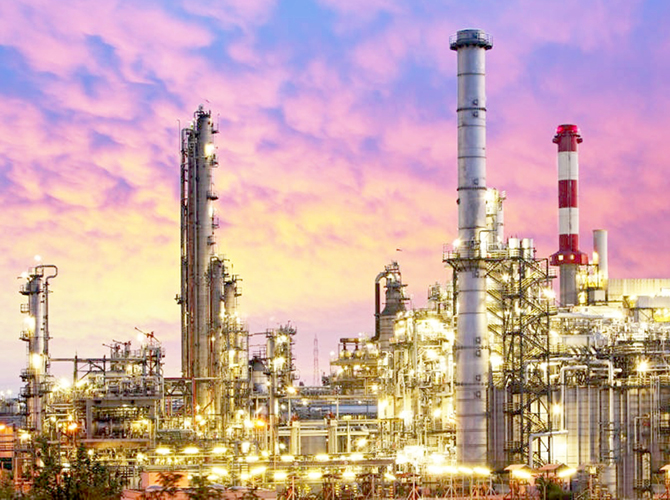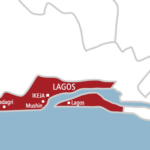Lagos was the cynosure of all eyes as it hosted former President Muhammadu Buhari, five other presidents, ambassadors, captains of industries, government officials and other international dignitaries at the commissioning of the Dangote Refinery and Petrochemicals in Ibeju Lekki.
The 650,000 barrels per day refinery is the largest single-train petroleum facility in the world. It would enable Nigeria to achieve self-sufficiency in refined products and even have a surplus for export.
Africa’s richest man and the president of the Dangote Group, Aliko Dangote, disclosed that the newly commissioned refinery would employ over 100,000 Nigerian youths, as well as generate over $21 billion, saving the country some huge forex that would have been used for fuel importation.
The Dangote Refinery and Petrochemicals is located at Dangote Industries Free Zone, which also houses, among other things, a fertiliser plant, purpose-built port, Dangote jetty, 435MW power plant that is able to meet the total power requirement of Ibadan distribution company, covering five states, including Oyo, Ogun, Osun, Kwara and Ekiti.
- Kano demolitions: Police arrest 57 over looting
- Hajj: We’ve processed 58,000 visas for pilgrims – NAHCON
During the commissioning, Dangote appreciated the Lagos State Government and its successive governors for the resolute facilitation of enabling business environment, which he noted had made him to invest over $30bn in various industries in the state economy.
“Those who have made Lagos their home will testify that since the beginning of the current democratic dispensation, the government of Lagos State has been exceptionally remarkable in its commitment and support for the private sector,” he said.
However, the biggest private investment in Africa was not initially designed to be built in Lagos State, the commercial capital of Nigeria, but for providence and unfriendly policies by some states, especially Rivers, Ondo and Ogun states, whose indigenes are counting their losses as Lagos makes gains.
Daily Trust Saturday reliably gathered that the project was moved to Lagos after the Dangote Group met brick walls, including insecurity, lack of infrastructure, hostile communities, pecuniary gain and lack of cooperation from state governors.
Dangote decided to build the refinery after his desire to acquire Brownfield refineries under the federal government’s privatisation programme in 2006/2007 was truncated by policy reversal.
It would be recalled that Blue Star, a consortium led by Dangote and his billionaire friend, Femi Otedola, paid $561million to acquire 51 per cent of Port Harcourt refinery in 2007. It also paid another $160m to acquire the same stake in the Kaduna refinery.
The late President Umaru Musa Yar’adua-led federal government refunded the $721m paid by the consortium for the two refineries owing to allegations that they were fronts for ex-president Olusegun Obasanjo. Since the botched sales, the federal government has spent more than $1.5bn on the turnaround maintenance of the 21,000 barrels per day Port Harcourt refinery.
Rivers State was considered to host the project when Dangote decided to invest in a Greenfield refinery. However, unfriendly policy and demands from both the state government and local government areas involved frustrated the move.
In a recent interview, the president of the Rivers Entrepreneur and Investors’ Forum, Ibifiri Bob-Manuel, alleged that the state government and the local governments where the refineries were to be located, Okrika and Eleme, made huge demands from the Dangote Group.
“When they called for a meeting with us, we went. It was discovered that preliminary land acquisition and agreement were gotten and perfected, but the amount of pushback and demands from the state government left them with no option but to situate the business where they were welcomed,” he said.
Efforts to get the reaction of the then governor of Rivers State, Rotimi Amaechi or his media team were unsuccessful at the time of filing this report, however, a close associate of the former governor, who did not want his name in print noted, “I still can’t understand how Rivers State lost the right to host the biggest refinery in the world to Lagos. The government of Amaechi had done everything possible to make sure that it was built here. He had commissioned me to engage a credible consultant to design the concrete bridge to link Onne from the naval base to the site. All of a sudden, Alhaji Dangote lost interest and started looking for another site. Rivers State was better because of closeness to the source of crude supply.
“Today, all the benefits, like employment, contract supplies and even minor construction, will accrue to Lagosians and the state. We have completely lost out. Our youths and elders should ask questions on how Rivers State lost its hosting right.”
Daily Trust Saturday learnt that similar demands and poor infrastructure also made Bayelsa State unattractive for the project.
The former Ondo State governor and his colleague in Ogun also blamed their predecessors over the failure of Dangote to situate the project in their states.
Governor Dapo Abiodun, who was the chairman of the Olokola Free Trade Zone that was meant to host the refinery, said the then governor, Senator Ibikunle Amosun, frustrated the project over disagreement with Dangote.
“That project was conceived with the aim of not just refining petroleum in Ogun, but also taking advantage of the mining lease that had been awarded around that corridor, which has not even begun to be exploited,” Dapo had recalled.
His chief press secretary, Kunle Somorin, in a statement on Tuesday, alleged that Amosun, “perhaps having a personal axe to grind with the promoter of the refinery project, Alhaji Aliko Dangote, frustrated all the efforts of Governor Abiodun and his committee.”
He added that rather than show enthusiasm towards hosting the project in the state, Governor Amosun “brazenly opposed and obstructed the efforts of the Abiodun-led committee in ensuring that the OKFTZ came into fruition.”
However, Amosun, who, alongside Abiodun, was at the inauguration of the refinery in Lagos, in a statement by his media aide, Bola Adeyemi, noted that Dangote took a business decision by siting the refinery in Lagos after initial consideration for the Olokola Free Trade Zone.
He said the Olokola Free Trade Zone project was not solely owned by the Ogun State Government, adding that the state was a minority shareholder of 14.5 per cent equity interest.
“No amount of concocted lies, blackmail and orchestrated falsehood will blight these unparalleled facts.
“It is, therefore, interesting to read that the present Ogun State governor holds me responsible for allegedly scuttling the Olokola project,” he said.
A former Ondo State governor, Olusegun Mimiko, who had come under criticism from prominent indigenes of the state, including the incumbent governor, Rotimi Akeredolu, for not showing enough interest in the project, had to also deny the allegation that he demanded bribes from Dangote.
“We state for the umpteenth time that Mimiko did not make any personal demand, cash or kind, or receive any personal gratification that led to the location of the factory in Lekki instead of Olokola.
“Again, this allegation is a blatant lie, and we hope that Alhaji Aliko Dangote would one day volunteer facts on why he chose Lekki over Olokola,” Mimiko had noted in 2022 in a statement by his special assistant on media and digital communications, Mr John Akinduro.
Missed opportunities
While these accusations and counteraccusations continue, there is no doubt that Lagos State has profitted from the losses of these states.
The state is expected to witness a boost to its internally generated revenue with the Pay as You Earn (PAYE) of the over 100,000 employees from the company. Apart from the development of the swampy community of Ibeju-Lekki to a modern city, over 400 artisans from the area were trained and employed. The community has also witnessed construction of schools, hospitals, awards of scholarship and access to micro credit systems, among others.
Lands and properties in the area have appreciated astronomically with the presence of government institutions. The area, which is now regarded as the fastest growing investment destination in the state, is also projected to host an international airport in the near future. The state government is relocating some ministries, departments and agencies to the Lekki corridor.
Bob-Manuel, who said states and communities needed to understand how to negotiate with business owners to attract businesses, lamented that the relocation of the refinery from Rivers to Lagos was a missed opportunity.
“You can only imagine the amount of impact the refinery is going to have on the revenue of Lagos State. Imagine that the investment was situated in Rivers State,” he said.
The interim administrator of the Presidential Amnesty Programme, Major-General Barry Ndiomu (retd), blamed restiveness in the Niger Delta for the choice of Lagos for the project.
“The Niger Delta lost a wonderful opportunity in the Dangote Refinery due to insecurity. I hope that lesson has been taken home by everyone, especially the youth, to stay away from violence and embrace dialogue in any situation they find themselves,” he said.
The chairman of the Nigerian Young Professionals Forum (NYPF) and convener of the Niger Delta Young Professionals, Moses Siloko Siasia, who said the refinery would have boosted job opportunities and enhanced the skills of the people, challenged governors and opinion leaders in the region to change the ugly narrative.
“It is a big lesson for our people that we must learn to be peaceful, non-violent and deliberately embrace sustainable economic investments in our region. Communities and our people should realise that the world has moved beyond myopic thinking. There are several other projects that were also taken away from us. Sadly, leadership within the region has not done much to change the narrative. If we continue like this, the Niger Delta will become a history of regrettable opportunities.
“The crude to be refined is coming from Niger Delta. It is a wasted opportunity for our people. We can’t continue to be the proverbial goose that lays the golden eggs but has nothing to show for it,” he said.
An Akure-based youth activist, Yemi Fasipe, said the refinery would have taken a lot of youths off the streets of Ondo State.
“It would have created massive job opportunities in Ondo State and empowered the people to be useful and productive. We have missed out on this opportunity, but we are hoping that both the federal and state governments would ensure that the Ondo Deep Sea Port recently approved by the federal government succeeds,” he said.
A professor of Accounting and Financial Development at Lead City University, Godwin Oyedokun, who said the Dangote Refinery was the best thing to have happened to Nigeria in recent years, counselled states to ensure an enabling environment for investors by promoting peace and developing infrastructures.
“States should know that when there is peace and the right infrastructure, investors will definitely come. Once there is an enabling environment like you have in Lagos State, investors would be attracted,” he said
The managing director/chief economist at Analysts Data Service and Resources Limited, Dr Afolabi Olowookere, who said the benefits of the refinery to the host community and Nigeria were enormous, called for the establishment of more industries across the country. He, however, said there would be associated risks, especially disruption in the social life of the people.

 Join Daily Trust WhatsApp Community For Quick Access To News and Happenings Around You.
Join Daily Trust WhatsApp Community For Quick Access To News and Happenings Around You.


